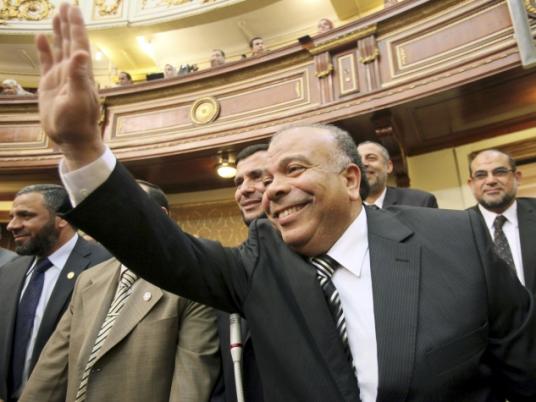
Egypt’s parliamentary speaker said the chamber would reconvene on Tuesday, risking a showdown with the army after the new, Islamist president defied the generals by quashing the dissolution of the legislature they had ordered last month.
Quoted by state news agency MENA on Monday, Saad al-Katatny — who, like President Mohamed Morsy, hails from the long-suppressed Muslim Brotherhood — said the lower house would sit from noon on Tuesday, overturning a court judgment and military order issued a month ago, before Morsy’s election.
The move, heralded by a decree issued by Morsy on Sunday — barely a week after he took office — threatens Egypt with fresh political uncertainty likely to take a toll on a fragile economy and dash the hopes of many desperate for a period of calm after 17 turbulent months since the overthrow of Hosni Mubarak.
However, in a signal that relations have far from broken down between Morsy and the army, the president and the head of the military council appeared together, looking relaxed and in conversation, at a televised event on Monday morning.
The military council, which had run Egypt since Mubarak was toppled by popular protests in February last year, handed powers to Morsy on 30 June, but it had sought to trim his authority shortly before he took office following a vote on 16 and 17 June. It had dissolved Parliament and taken legislative power for itself.
Yet in a move that seemed to take even the generals by surprise, Morsy said on Sunday he was recalling Parliament and would hold an election once a constitution was in place, meaning that Parliament would not serve a full four-year term.
The row is part of a broader power struggle that could take years to play out, pitting Islamists against generals whose fellow officers ran Egypt for six decades and an establishment still packed with Mubarak-era officials.
But the immediate impact may be to make it more difficult for the president to stabilize an economy fast heading toward a balance of payments and budget crisis. The stock market reacted to Sunday’s news by plunging more than 5 percent at the open.
“Early confrontation,” wrote Al-Akhbar newspaper, summing up a decision which could end a brief honeymoon with the military council, led by Field Marshal Hussein Tantawi.
Yet Morsy and Tantawi showed no hint of discord on Monday when the president, as he did last week, attended a military parade. Seated next to each other, Morsy and Tantawi turned to each other in a brief jovial exchange, live television images showed.
And in a possible signal that the generals would not openly challenge Morsy, the state news agency reported that guards at Parliament allowed some members back into the building after it had been declared off limits when the army ordered it dissolved.
Some analysts said Morsy’s decision to order early elections could offer a compromise by acknowledging the court's assertion that the election to the chamber breached some legal rules.
But even if the army does not seek an open row, Morsy could be setting himself on a course for confrontation with liberal and other politicians and the judiciary.
“The decree is overturning a state where the rule of law reigns. I advise you, Mr. President, to withdraw it because you swore to respect the law and the constitution,” said Egyptian rights activist Hafez Abu Seada, writing on Twitter.
Legal questions
“The president cancels the decision of the field marshal,” wrote the daily Al-Masry Al-Youm, while Al-Mal business daily carried the banner headline: “Back to your barracks.”
The generals met late on Sunday to discuss Morsy’s decree but did not release a statement. The Supreme Constitutional Court, which on 14 June ordered the lower house of Parliament dissolved, said it would meet on Monday to review the move.
Farouk Sultan, who headed the court when it dismissed the Parliament citing flaws in the election rules, said Morsy’s decision had no legal basis. Sultan had administered the oath of office to Morsy on 30 June, before his term on the court ended.
Though some officials in Morsy’s Muslim Brotherhood had indicated that they interpreted the current, interim rules as giving the president the legal authority to recall Parliament, analysts had expected the president to take a more cautious approach to avoid a head-on clash.
The military council has less formal room for maneuver now that it has transferred presidential powers to Morsy, so the public drama may play out in prolonged wrangling in the courts.
“I am not sure that power struggles played out in the legal sphere, and which add to the legal uncertainty of the past year and a half are healthy — either for us or the rule of law,” said Heba Morayef of Human Rights Watch.
Morsy, however, is in a position unthinkable a year and half ago, when the Brotherhood was still banned and its members hounded by Mubarak — even if the army has stripped his presidency of some of the authority the office enjoyed under Mubarak, such as being supreme commander of the armed forces.
Economic crisis
In one of his most high-profile meetings since taking office, Morsy met US Deputy Secretary of State William Burns at the presidential palace on Sunday, signaling the new ties Washington is forging with resurgent Islamists in the region.
Burns pledged that the US, which grants the Egyptian armed forces US$1.3 billion a year in military aid, would support Egypt’s economy, which has been hemorrhaging cash and is heading for a balance of payments and budget crisis.
Once a darling of emerging market fund managers, Egypt has watched foreign investors flee and its vital tourist trade has taken a big knock from the turmoil of the last year and a half.
Foreign reserves have plunged to about $15.5 billion, less than half their level before anti-Mubarak protests erupted, and the government has been forced to pay double-digit interest rates, seen as unsustainable, to fund its spending.
“Already domestic financing has reached a critical stage where you can’t rely totally on the market anymore,” said one Western diplomat. The government was running up payment arrears with energy suppliers and raising funds from the central bank, the diplomat noted — tactics sustainable only for a short time.
Adding to the murky outlook that is unsettling investors, legal wrangling looks set to continue. Following the judges’ dissolution of Parliament and scrapping of a constitutional drafting panel appointed by Parliament, further challenges in the courts could yet derail a second drafting panel.
As well as facing scrutiny by the Supreme Constitutional Court, Morsy’s decision to recall Parliament may also be challenged by rivals in the courts. Lawyer and liberal MP Abul Ezz al-Hariry told Reuters he would file a suit on Monday. Hariry was a presidential candidate who fell out of the race in the first round.

